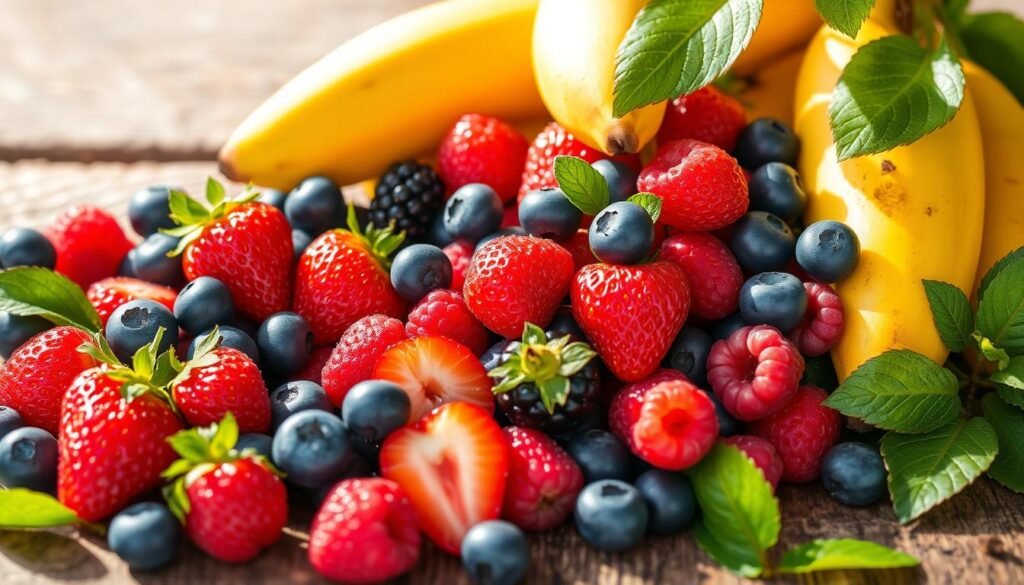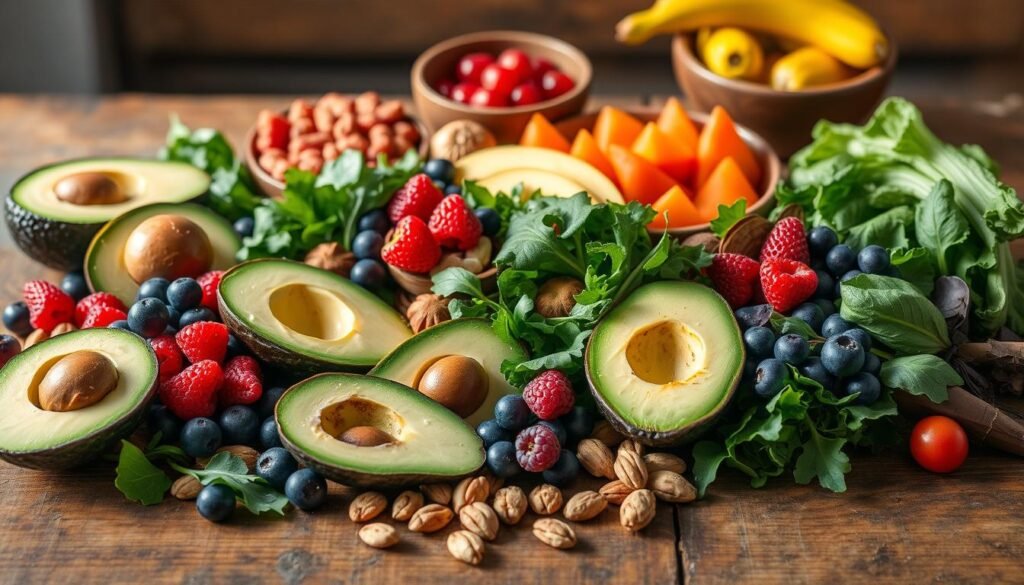Did you know nearly one in five adults in the U.S. faces mental health issues? Depression tops this list. This fact shows how vital it is to find foods that improve mental health. A diet that boosts mood matters a lot. What we eat deeply affects our mood and energy levels. Eating certain nutrient-rich foods is good for mental health and overall happiness.
Our brains need vitamins, minerals, and omega-3 fatty acids to stay happy. Eating complex carbohydrates, lean proteins, and healthy fats keeps the brain working well. Embracing these foods is key to boosting your mood and fighting fatigue.
There are many foods that can help improve your mood. Whole grains, cold-water fish, and colorful veggies are great for fighting depression. They work together to support mental health and keep you energetic. For more on these foods, check out the guide to foods that fight fatigue and depression.
Key Takeaways
- Consuming complex carbohydrates helps provide stable energy to the brain.
- Vitamins like B-12 and D are linked to mood regulation and overall mental health.
- Omega-3 fatty acids from sources like salmon support brain and mental health.
- Foods rich in antioxidants, such as colorful vegetables, aid in fighting depression.
- Staying hydrated is critical for maintaining mental clarity and focus.
Understanding Fatigue and Depression
Fatigue is more than feeling tired. It’s a deep physical and mental exhaustion that affects your day-to-day life. It’s important to see how it connects with depression. Depression can make people feel sad, hopeless, and unmotivated. This often goes hand in hand with fatigue. In fact, 90% of people with depression also struggle with fatigue. This shows how key mental health awareness is, especially about what we eat.
Not getting enough nutrients, like folate and vitamin D, can make depression worse. Research finds that people who don’t get enough folate, especially smokers, tend to be more depressed. Low vitamin D levels also link to more depression symptoms. By filling these nutritional gaps, we might boost our mental health. Also, places with less omega-3 in their diets see more depression cases. Changing what we eat could be a big step in fighting depression.
When we think about fatigue and depression together, we start to see the bigger picture of health. Eating foods loaded with antioxidants, proteins, and complex carbs can lift your mood and energy. So, it’s crucial to talk about how a good diet supports our mental and physical health.
The Role of Diet in Mental Health
The link between diet and mental health is getting lots of attention. Studies show that following a good diet, like the Mediterranean diet, can lower depression risk. This diet is all about eating nutrient-dense foods such as fruits, vegetables, whole grains, and healthy fats, which help your mental health.
On the other hand, eating lots of refined carbs and sugars can hurt your mental state. Foods with a high glycemic load can make depressive symptoms worse. People with depression might eat foods that cause inflammation and miss out on the brain-boosting nutrients found in a balanced diet.
Research also connects dietary patterns with inflammation levels. Sticking to a Mediterranean diet can reduce inflammation, possibly easing depressive symptoms. Also, omega-3 fatty acids in fish like salmon can fight inflammation and may help against depression caused by cytokines.
More studies are looking at how gut health affects your mind. Changes in gut bacteria can affect your mood. Having healthy gut bacteria might lessen mood disorder risks. That’s why eating nutrient-dense foods is key to great mental health.
Eating foods that boost serotonin, like yogurt and kefir, can improve your mood. Vitamins B-12 and B-9 are crucial for your nerves and can ease mood disorder symptoms. You can find these vitamins in dark leafy greens, nuts, and whole grains.
Choosing a diet full of brain-boosting nutrients and whole foods can better your mood and energy. This way of eating not only helps beat fatigue and depression but also leads to a healthier life.
Nutrient-Rich Foods That Combat Fatigue
Beating fatigue is easier when you eat nutrient-rich foods every day. You should eat plenty of whole grains and complex carbohydrates. They keep your energy levels steady and improve your mood.
Try foods like oatmeal, brown rice, and whole wheat products. They give you energy slowly. This helps avoid sudden energy drops or mood swings. They also help in making serotonin, which is important for a happy and stable mood. To learn more, click here.
Whole Grains and Complex Carbohydrates
Whole grains have complex carbs, giving you constant energy all day. Great options include:
- Oatmeal
- Brown rice
- Quinoa
- Whole grain bread
They’re full of nutrients and help you stay energized, especially if you’re tired. Unlike refined grains, like white rice, whole grains help avoid mood dips. This makes them a smarter choice for a better diet.
Lean Proteins for Sustained Energy
Lean proteins help keep energy high and support your health. They repair tissues and make neurotransmitters that uplift your mood. Foods rich in proteins include:
- Chicken
- Fish
- Eggs
- Legumes (beans, lentils)
- Tofu
Eating chicken breast, for instance, boosts your serotonin through tryptophan. Adding lean proteins to your meals fends off tiredness. It shows how key good nutrition is for our mental health.
Foods That Fight Fatigue and Depression
It’s key to know how certain foods affect mood and energy. Foods like cold water fish and nuts are rich in nutrients. These nutrients are crucial for mental health and act as natural energy enhancers.
Cold Water Fish: Omega-3 Fatty Acids
Cold water fish like salmon, mackerel, and sardines are full of omega-3 fatty acids. People who eat a lot of fish tend to be less depressed. Omega-3s help the brain by cutting down inflammation and helping neurotransmitters work better. This is important for improving mood and building emotional strength.
Nuts and Seeds: Natural Energy Boosters
Nuts and seeds are considered good for the brain. They’re packed with healthy fats, protein, and magnesium. Eating walnuts can reduce depression scores by 26% if you eat them often. Pumpkin and sunflower seeds are great for getting magnesium. This can make you feel happier by increasing serotonin. Just a handful of these can boost your energy and fight tiredness well.

| Food Item | Key Nutrients | Benefits |
|---|---|---|
| Salmon | Omega-3 fatty acids | Supports brain health, reduces depression risk |
| Walnuts | Omega-3 fatty acids, Protein | Boosts mood, energy, and optimism |
| Chia Seeds | Omega-3 fatty acids, Fiber | Promotes energy levels, and aids in digestion |
| Pumpkin Seeds | Magnesium, Tryptophan | Enhances mood, supports serotonin levels |
Vegetables That Improve Mood
Eating different vegetables can really make you feel better. Leafy greens and bright veggies give us nutrients that help control mood and energy.
Leafy Greens and Their Benefits
Spinach, kale, and collard greens have lots of magnesium-rich foods. They’re filled with folate, important for our brain and lowering depression risk. Eating these often can make us happier and more energized.
These mood-enhancing vegetables also fight off tiredness during the day.
Brightly Colored Vegetables and Antioxidants
Bell peppers, carrots, and tomatoes are full of antioxidants. These fight stress and inflammation in our body, which can affect our mood. Eating lots of different colored veggies makes meals fun and healthy.
Adding these energy-boosting veggies to your daily meals can help protect against feeling mentally tired and keep your mood up. A balanced diet with these veggies improves mental sharpness and feelings of happiness.
For more details on how vitamins and minerals are key to feeling energetic, visit this resource.
Fruits to Include in Your Diet
Fruits are key in lifting your mood and fighting fatigue. They are packed with essential nutrients and antioxidants. Adding different fruits to your daily diet boosts health and supports mental health.
Berries: Nature’s Mood Enhancers
Berries like strawberries, blueberries, and raspberries boost your mood. They are rich in antioxidants, which protect brain cells and help with thinking. Eating berries often may make you happier and keep your mind sharp. You can add them to smoothies or eat them as snacks for a better diet.
Bananas: Quick Energy Boost
Bananas are great for a fast energy lift. They have a lot of potassium, which helps keep energy levels up. Bananas also have vitamin B6. This vitamin is needed to make neurotransmitters, which help control mood. Adding bananas to meals or as snacks can quickly reduce tiredness.

Eating these fruits not only tastes good but also helps your mental health. To learn more about how diet affects anxiety, click here.
| Fruit | Key Nutrients | Mood Benefits |
|---|---|---|
| Berries | Antioxidants, Vitamins C & K | Improves mood, protects brain function |
| Bananas | Potassium, Vitamin B6 | Quick energy boost, supports mood regulation |
The Importance of Hydration for Mental Clarity
Being well-hydrated is key to clear thinking and staying healthy. Our bodies are about 60% water, which shows how vital water is. If we lose just 1-3% of our body weight in water, our brain function can drop. We may feel tired and find it hard to focus.
Water: The Essential Element
It’s often said that we should drink eight glasses of water a day. Not drinking enough can raise the chance of headaches and constipation. In fact, 47% of men who drank more water saw their headache symptoms get better. So, good hydration helps our mind and body stay fit.
Adding 50.7 ounces of water a day improved migraine symptoms for some. Kids aged 9 to 11 who drink about 10.5 cups of water show greater mental agility. Being hydrated boosts energy, self-esteem, and focus, which is important for college students under stress.
What we drink matters too. Mineral water with magnesium and sodium is good for bowel health. Eating water-rich foods like watermelon and spinach also helps. The Academy of Nutrition and Dietetics says 20% of our daily water should come from such foods.
| Factor | Impact of Hydration on Health |
|---|---|
| Brain Function | Mild dehydration can impair cognitive abilities. |
| Mood Improvement | Rehydration enhances mood and reduces anxiety. |
| Weight Management | Drinking water before meals can boost metabolism. |
| Digestive Health | Increased water consumption reduces constipation risk. |
| Kidney Stones | Higher water intake lowers the risk of stone formation. |
Finally, drinking enough water is crucial for mental sharpness and overall health. Keeping hydrated helps fight off fatigue and keeps our minds sharp.
How to Incorporate a Mood-Enhancing Diet
Adding healthy foods to daily eating can greatly change mood and emotional health. Mood-enhancing diet strategies suggest eating nutrient-rich foods over processed ones. Eating lots of fruits, vegetables, fish, and whole grains is key for better mental health.
Planning meals is vital for keeping up with healthy eating. Spending time each week on meal prep helps people eat more nutritious foods. It’s good to eat different fiber-rich crops like leafy greens, nuts, and beans. These foods add variety and boost mental health. Eating small, balanced meals keeps energy up and tiredness down.
Here are some tips for a better mood through diet:
- Prioritize whole and minimally processed foods.
- Try new recipes with nutrient-rich ingredients.
- Drink plenty of water and herbal teas to stay hydrated.
- Slowly eat less sugar and foods high in saturated fats.
- Use spices like ginger and turmeric because they fight inflammation.

Being mindful while eating changes the experience. Paying attention to tastes, textures, and how food nurtures can make meals more fulfilling. This also helps improve mental health.
The table below shows foods that can make you feel better and why:
| Food | Benefit |
|---|---|
| Leafy Greens | Rich in folate, assisting in alleviating depression. |
| Fatty Fish | High in omega-3 fatty acids, beneficial for brain health. |
| Berries | High in antioxidants, protecting the brain from oxidative stress. |
| Fermented Foods | Support gut health, reduce inflammation, and enhance mood. |
| Whole Grains | Provide steady glucose release, stabilizing energy levels. |
Eating these suggested foods while practicing mindful eating can lead to a healthier life and better mood.
Fatigue-Fighting Recipes to Try
Creating meals that satisfy hunger and fight fatigue is very rewarding. These recipes use whole, nutrient-rich ingredients. They offer healthy meal ideas that boost energy and mood. Here are a few great recipes that show the power of nutritious cooking.
-
Quinoa Salad with Leafy Greens and Nuts
This refreshing salad has cooked quinoa, baby spinach, walnuts, and cherry tomatoes. Quinoa is a great source of complex carbs and protein. Adding spinach brings magnesium and iron. Top it off with a simple olive oil dressing for extra flavor. -
Berry Banana Smoothie
Make this delicious smoothie with frozen blueberries, ripe bananas, and Greek yogurt. It’s full of antioxidants and potassium for a nutritious energy boost. Perfect for keeping you going all day. -
Turkey Burger with Sweet Potato Wedges
Serve grilled lean turkey patties seasoned with herbs alongside baked sweet potato wedges. Sweet potatoes give you fiber and vitamins for brain health. Turkey is rich in tryptophan, lifting your mood. -
Spiced Salmon and Tomato Traybake
On a tray, layer sliced tomatoes under salmon fillets seasoned with spices. Roasting brings out the omega-3 fatty acids in salmon, vital for mood enhancement. A delicious way to feel better. -
Overnight Oats with Chia Seeds
Mix oats, chia seeds, almond milk, and fresh fruit in a jar. Let it sit overnight in the fridge. Oats and chia seeds provide energy and fiber. It’s a great start to your day.
These fatigue-fighting recipes showcase tasty ingredients and contribute to well-being. They focus on healthy meal ideas and nutritious cooking. People can enjoy meals that help with mental clarity and energy. Try these simple recipes for a healthier lifestyle.
Conclusion
The link between diet and mental health is getting stronger. Eating well, with lots of vegetables, fruits, fish, and whole grains, boosts energy and mood. Studies show that a Mediterranean diet can make you feel more positive and lower depression risks.
Making smart food choices is key to feeling good. Try to eat two servings of fish weekly and lots of high-fiber foods. Drinking enough water also fights off tiredness and low mood. Adding foods that help with energy and to your diet helps keep you well, inside and out.
Focusing on foods rich in antioxidants, omega-3s, and vitamins is vital for your mental health. Understanding how what we eat affects our feelings and energy levels guides us to a healthier life. This knowledge encourages us to make better food choices every day.